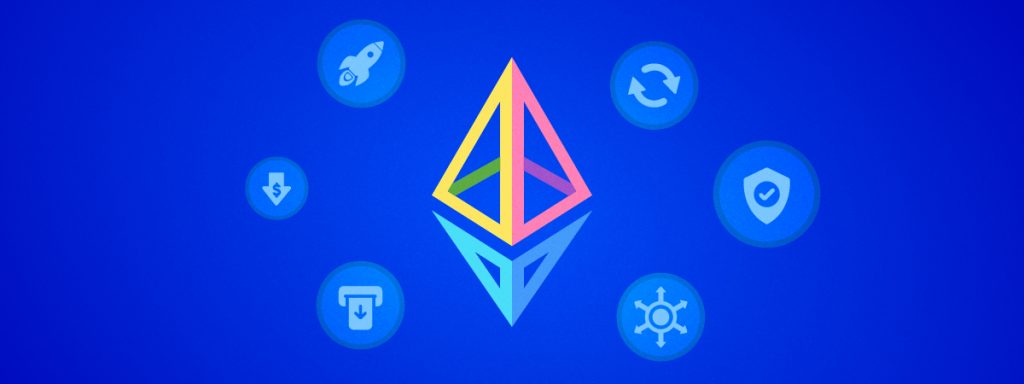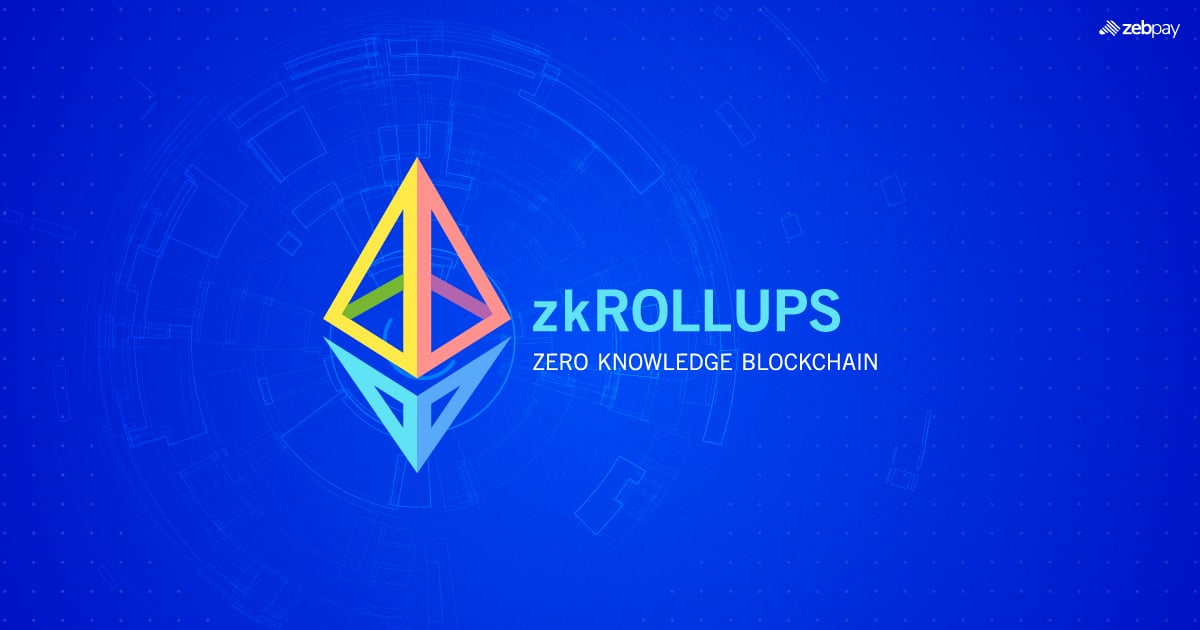Zk rollup is a layer-2 scalability solution that enables blockchains to complete transactions faster while keeping gas fees minimal. Zk rollups combine on and off-chain processing to perform better than layer-1 blockchains.
Zero-knowledge rollups, or Zk rollups, bundle transactions into sets that are executed off-chain. Off-chain computation reduces transactions on the main blockchain. This process involves producing a summary of changes needed for all transactions in a batch rather than sending each transaction individually. Zk rollup also produces validity proofs to prove the accuracy of their changes.
How do ZK Rollups Work?
Zk rollups consist of two core components: on-chain contracts and off-chain virtual machines. On-chain contracts are smart contracts that control the ZK roll-up protocol. On-chain contracts have a main contract that stores roll-up blocks, tracks deposits, and makes updates. Another type of on-chain contract is the verifier contract, which verifies zero-knowledge proofs.
The Zk roll-up protocol operates on the Ethereum blockchain, but transactions occur on a separate virtual machine. Off-chain virtual machines serve as the execution layer for transactions on the Zk rollup. Validity proofs on the Ethereum blockchain guarantee the accuracy of blockchain transactions on the off-chain virtual machine. Off-chain protocols operate independently but are secured by the Ethereum mainnet. Ethereum enforces the validity of updates and ensures data availability after every update to the rollup’s state. This feature is why Zk rollups are considered safer than off-chain scaling solutions like sidechains.
Benefits of Zero Knowledge Rollups

- ZK rollups use a trustless cryptographic mechanism to be secure. Compared to the honor system of optimistic rollups, a trustless cryptographic setup is more secure.
- The validity proofs of Zk rollups authenticate off-chain transactions and prevent wrong changes to Ethereum’s state.
- Zk rollups update the state of their host blockchains by storing compressed data on-chain to ensure security and decentralization.
- The transaction challenge period completes faster as the blockchain only needs to verify validity proofs within the rollups.
- Withdrawal delays are also minimal in Zk rollups.
- Users pay lower fees as Zk Rollups reduce the cost of publishing data on-chain because of efficient data compression techniques.
The Limitations and Challenges of Zero Knowledge Rollups
- One of the vital components of ZK rollups is zero-knowledge proof systems. These systems demand trusted mechanisms. The security of a ZK rollup can be compromised by mishandling a trusted setup.
- Implementation of ZK rollups is complex. It is difficult and time-consuming to compute a zero-knowledge proof. These roll-ups require data optimization to get maximum throughput. Additionally, complex mathematics is needed for the functionality of ZK rollups.
- ZK rollups are vulnerable to attacks from malicious operators. Expensive hardware limits the number of participants and thus leads to censorship.
- Some ZK rollups use a single node as their sequencer. This feature leads to a centralized structure and can affect the order of transactions. There is a risk of centralization when limiting the position of sequencers to a few.
ZK Roll-Up Example
A popular scaling solution using ZK rollups is zkSync. This scaling solution launched zkSync 2.0 recently. It will enable developers to deploy dApps on the network. StarNet is another project using ZK rollups to scale transaction throughput. Leading crypto protocols like ImmutableX use StarkNet solutions to execute fast settlements and low-cost transactions. Crypto networks outside Ethereum, like Syscoin, use ZK rollups to enable scalability without sacrificing decentralization because they store data off-chain.
Read more: On-Chain vs Off-Chain
The Future of ZK Rollups
ZK rollups will play a significant role in the future of crypto technology as they have witnessed growing use cases and successful adoptions. Some of its future use cases and expansion are as follows.
- Supply chain management: ZK rollups can be used to track vehicles and the movement of goods through a supply chain. Businesses can securely track the progress of their product as transactions are executed off-chain.
- Decentralized exchanges: ZK rollups can enable fast trading of crypto assets by powering decentralized exchanges. ZK rollups execute trades off-chain to reduce the load on the blockchain network and allow faster trade settlements.
- Data storage: ZK rollups can be used to secure and manage large databases such as personal information or medical records. Databases can be managed and secured efficiently as transactions are executed off-chain.
- Gaming: ZK roll ups can power gaming platforms for efficient and fast gameplay. ZK rollups can reduce the load on the crypto network and enable real-time gameplay.
Read more: What Is GameFi
Conclusion
There will be increased adoption of ZK rollups in many industries soon. Many experts claim that zero-knowledge rollups are a superior layer-2 solution as they do not require conflict resolution mechanisms. Although they have some drawbacks, such as vulnerability against centralization and censorship, ZK rollups offer better security as they can leverage Ethereum’s security. These challenges are not permanent, as many ZK rollup projects are working to address them.
The reliance on rollups can continue to rise should Ethereum grow in stature. These rollups can integrate with future upgrades of the Ethereum blockchain to make it cheaper and easier to use for everyday users.
You can learn more about crypto on ZebPay blogs. Experience the power of crypto trading with ZebPay Australia.
FAQs on ZK Rollup
What is Zk Rollup, and How Does it Work?
Zk Rollup is a Layer 2 scaling solution for Ethereum that enables high-speed and low-cost transactions. It works by aggregating multiple transactions into a single transaction, reducing the load on the Ethereum mainnet.
What are the Benefits of Using Zk Rollup?
Zk Rollup offers several benefits, including faster transaction speeds, lower transaction fees, increased scalability, and improved privacy. It also enables decentralized exchanges to be built on top of Ethereum.
How Does Zk Rollup Compare to Other Scaling Solutions?
Compared to other scaling solutions, Zk Rollup has several advantages. It offers better scalability and security than Plasma and Optimistic Rollup, and it is more efficient than Sidechains. Zk Rollup also has a lower gas cost than other solutions.
Are There any Downsides to Using Zk Rollup?
One potential downside of Zk Rollup is that it requires more complex cryptographic proofs than other scaling solutions, which can make it more difficult to implement. Additionally, Zk Rollup is not yet widely adopted, so there may be some uncertainty around its long-term viability.

